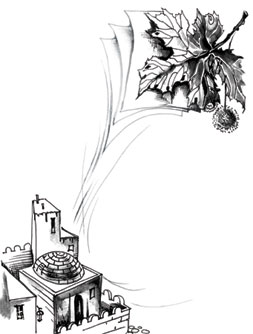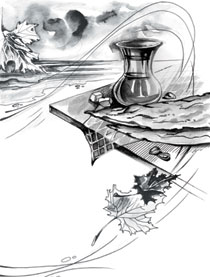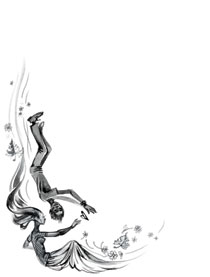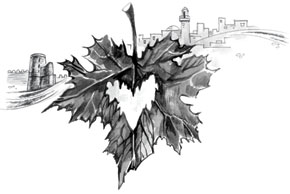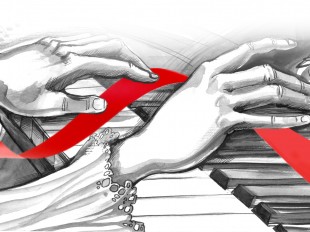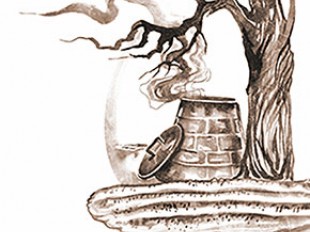When I say that I love the Baku wind everyone looks at me as though I were an alien freak. They make that twisting motion with one finger against their temple – what’s to love about it? It throws sand in your eyes, blows rubbish all over the place and ruins plans for a day on the beach. For some reason everyone forgets that it’s the Baku wind, and not some airless Japanese air conditioner, that comes to our aid when the temperature is pushing 40 and we can hardly breathe. It’s enough to sit in the shade of a plane tree – and there it is, a refreshing sea breeze, no need for a fan.
It was this ordinary wind of an extraordinary southern town that taught me that the desire to do good should not be part of a plan to get something back in return. Just as love should not be sold in return for love – just given, otherwise what use would it be? It would be easier to go the oriental bazaar and haggle for half the price. Not all kinds of human happiness can be sold at a discount.
***
We met, she and I, on the windiest day in June. She was hurrying to a French class at the French embassy while I had left Molokan Gardens and was heading down what used to be Karganov Street towards the seafront. The tempestuous wind flung the June heat from side to side, lifted up the skirts of self-conscious girls and tore the day’s paper out of the hands of pensioners. And it knocked our heads together when she dropped her books and I tried to help her pick them up. Putting her hair behind her ear, she murmured an embarrassed “thank you”. We would have gone our separate ways if I hadn’t started a conversation. I fell in love straightaway with her gentle squint, her melancholically husky voice and fine arms, on the wrists of which jangled bracelets of mini-coconuts... My recollections of what happened next are hazy – in love, time loses its importance.
All the best things in my life began with her. We fell asleep in the shade of a tall eucalyptus and at that moment the solitude of “before we met” seemed worthwhile – it had been worth dreaming of her for so long in order to meet her years later. I don’t even remember my part in what happened – only you and the June wind. We loved each other without regard for the future, without thought for the past, without conventions or platitudes. We wanted to love and we did love. We cut up time into pieces that suited us. We chose ourselves whether it would be day or night, November or May. Whatever month it was, it was always, without fail, windy. Though it’s windy in Baku practically all year – only the direction and nature of the wind change – from the southern Gilavar to the northern Khazri and back again.
You loved the Gilavar, the wind born in the baking, yellow deserts, full of the velvety moisture of the sea, while I loved the slightly selfish Khazri, bursting into the warm city from the backwaters of the cold oceans. “Warmth in the home, in relationships, depends on women, warmth everywhere, in everything. Women, unlike men, set off in search of happiness independently. We rely only on ourselves. But you men, you look for the woman who will believe in you. You need the woman who will dot all the i’s for you, although you are ready to do all the writing yourself.”
No-one else shared our love for the Baku wind. “Just look what it’s doing! First it blew down the Christmas tree on Azneft Square, then the one on Azadliq. It’s out of control.” We laughed but really we were insulted on behalf of our city’s main dignitary. The Baku wind recalls Wilde’s Canterville ghost, so kind within, so incomprehensible without.
***
We are sitting in the heart of the Old City, in a small cafe that serves excellent herb kutab pancakes and drinking their green, mint tea. Our preferences, like the city of Baku, reflect the eternal contrast of East and West. I remember my maternal grandmother – Sona. She lived in Amirjan, one of the old settlements on the Absheron Peninsula, 16 kilometres from Baku. There is a lot of sun there; the sun is in the palm of the sky, and you can see it from everywhere as there are no tall buildings.
I love Amirjan for my childhood spent in its winding streets and alleys, for the call to prayer that pours out five times a day from the picturesquely beautiful Mukhtarov Mosque, for the venerable mulberry trees in whose shade I played for hours at a stretch. In the first weeks of June my brother Chingiz and I would clamber up its mighty branches to eat the dark, sweet claret-red fruit. The juice trickled down our arms and chins and left red stains on our clothes. They wouldn’t wash out, but our parents didn’t mind – you cannot have an Amirjan summer without mulberry stains.
Grandma Sona made fantastic kutab pancakes in her tandir oven. What we are eating now are sad imitations. Grandma would embark on kutabs only when it was cold, when the Khazri blew, capable of getting into houses through the tiniest of cracks. Grandma made Amirjan kutabs. Unlike the Baku variety, they have ruby red pomegranate seeds added to the mince. “Your great-grandmother Perizad taught me how to make them. That was when Amirjan was still called Khile, so they are known as Khile kutabs. The pomegranate is just right as lamb is fatty and needs the sharper taste.” Sona added abgora, the fermented juice of unripe grapes, to the Khile kutabs. She always had a couple of bottles of this tincture in her cellar – they’ve not thought of a better medicine yet for high blood pressure.
The cafe terrace is empty as people won’t come until evening. We like the silence of the Old City. It’s right in the centre of Baku, but it’s always inexplicably quiet, as though it has an invisible dome on top. Though the Gilavar blows the poplar fluff everywhere. Sneezing, everyone complains in unison about the “summer snow”. Just like small children! Poplar fluff is such obvious, well, not evil, it’s just life, like the heat of summer and snow in winter. It flies about and bothers us for a week, then it’s gone, and you no longer have to brush the unmelting “snowflakes” from your cheeks.
At the same time as my story about my childhood in Amirjan, she is remembering her grandmother who also used to get her family together for kutabs when the Khazri blew. It’s surprising that two very different families are united in a single tradition. Then you remember that it is the East. They still respect traditions here however much we are integrated into Europe or, to be more exact, Europe is integrated into us.
Her grandmother was from Novkhani, another old Absheron settlement, known for its camel-meat kutabs. “I loved them when I was little. They were tasty and tender and melted in the mouth. One day Mum told me that they were stuffed with camel meat and as a mollycoddled child of the city I was truly shocked. I couldn’t bring myself to touch Grandma’s kutabs for a long time. I only began to eat them again just a few years ago. You’ll agree that camel meat is very like beef, it’s hard to tell them apart...” – “Yes, the first time I ate Novkhani kutabs I thought they were made from beef. You know that camel meat is considered healthy as it has no layers of fat.”
***
The Baku wind has the habit of going off by itself for a while. It might not appear in the city for weeks, giving the flags on their flagpoles a breather. When I was a child, I would walk on such days with my head thrown back and look at the motionless clouds through a piece of green bottle glass. It was on this kind of day that we went our separate ways. And we did go our separate ways, we didn’t break up. It was just that the single path, our path, divided into two winding paths, and Great Walls of China sprang up and we couldn’t see each other anymore. She went away to university in Paris, and not everyone’s feelings can stretch long distances.
When we went our separate ways, I thought in the despair of rainy days: that’s it, the end, the purpose of my life is gone. It has gone with the wind forever. Time passed, the winds went away and returned. The day came when I realized that any purpose of life is something that we invent and believe in of our own accord.
Now I believe in the here and now, in the place, the sensation of the present moment. Every morning I open the window and take my fill of the new day, just as it is. I remember my grandfather Asad saying as he shot sparrows from the tops of the persimmon trees: “A child who cannot be master of time cannot be master of himself.” I didn’t understand his words at the time, but for some reason I remembered them, learnt them by heart. And they came in useful.
Illustrated by Evelina Aliyeva Translated from Russian by Anne Thompson
